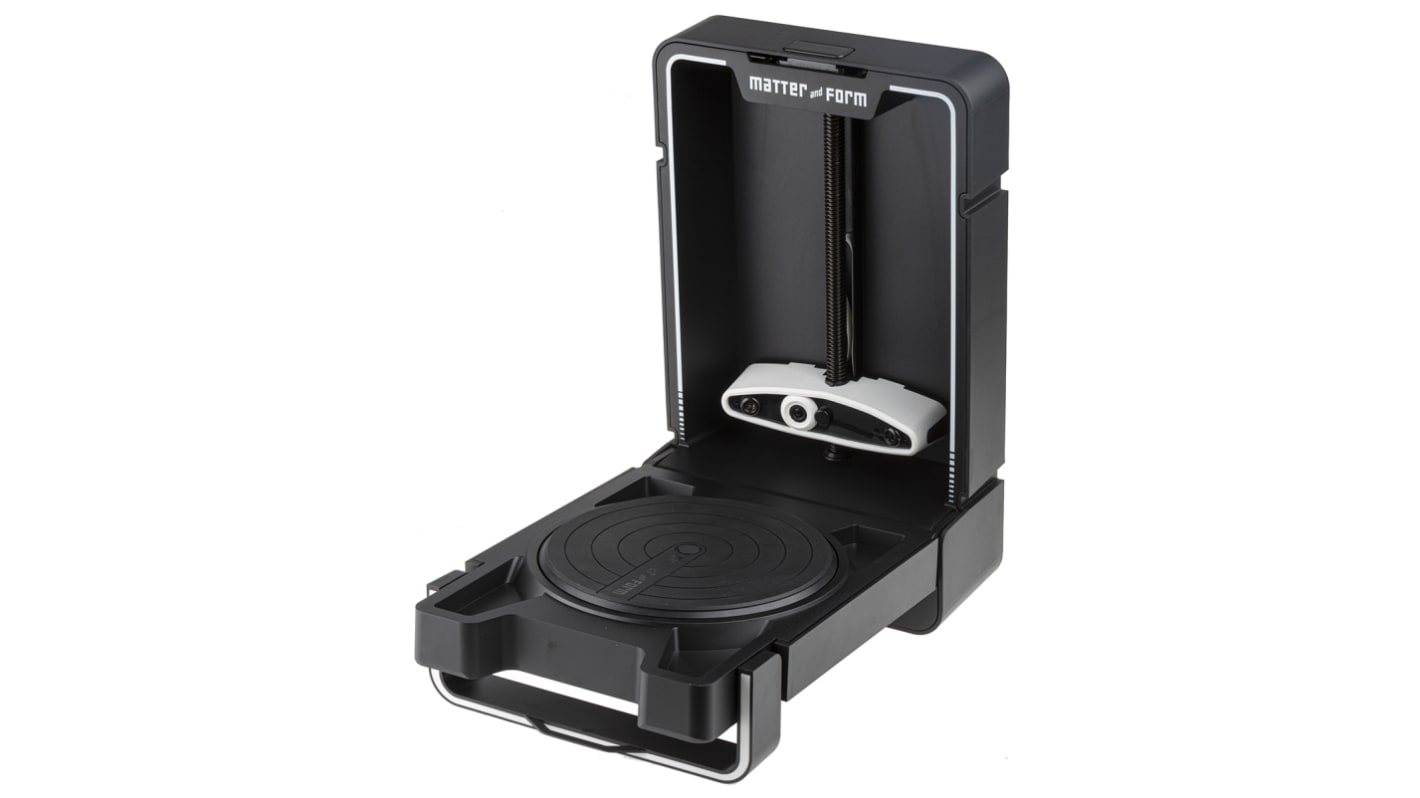V2 +Quickscan
- RS stock no.:
- 179-7079
- Mfr. Part No.:
- MFS1V2
- Manufacturer:
- Matter and Form
Discontinued product
- RS stock no.:
- 179-7079
- Mfr. Part No.:
- MFS1V2
- Manufacturer:
- Matter and Form
- COO (Country of Origin):
- CN
Matter and Form 3D Scanner
The Matter and Form 3D scanner has a really nifty compact design and is a turntable-based setup meaning the size of objects you scan is fairly limited but the actual scanning process is largely automatic. Using an eye-safe laser scanner and the MFStudio with +Quickscan software you will be able to capture a digital replica of your object with up to 0.1mm accuracy.
How to set up Matter and Form 3D scanner?
This 3D scanner comes packed away neatly with a few cables, a power adapter and calibration card and a small plastic toy.
Setting up for scanning is incredibly easy simply press the top button down, fold the turntable out and rotate the handle down to form a front leg. Due to its compact size, it easily fits on the table next to your device ready to be plugged in.
When you are choosing the surface consider that it shouldn't wobble or possibly ending up moving during scanning. Once your 3D scanner is in place, connect the USB and power cables to the scanner and you are good to go.
Setting up for scanning is incredibly easy simply press the top button down, fold the turntable out and rotate the handle down to form a front leg. Due to its compact size, it easily fits on the table next to your device ready to be plugged in.
When you are choosing the surface consider that it shouldn't wobble or possibly ending up moving during scanning. Once your 3D scanner is in place, connect the USB and power cables to the scanner and you are good to go.
So what can you scan with this 3D scanner?
The largest object you can scan is 25cm high by 18cm in diameter. You are also limited to the object of 3kg or less so you don't burn out the turntable motor. This Matter and Form scanner is a laser-based system which takes slices of data at a time and as the platform rotates it builds up a 3D point cloud.
How to get the best out of this 3D scanner?
Lighting is very important for getting a good scan and its easy to get it right. There are 3 things to remember:
1. don't position the scanner so the camera is facing a bright light source (window or a lamp)
2. don't point spotlights, desk lamps or other bright lights at the camera bed
3. normal ambient room light is the best
If you come across any connection problems make sure to reboot your scanner and your computer to fix this.
1. don't position the scanner so the camera is facing a bright light source (window or a lamp)
2. don't point spotlights, desk lamps or other bright lights at the camera bed
3. normal ambient room light is the best
If you come across any connection problems make sure to reboot your scanner and your computer to fix this.
Features:
• Scans as fast as 65s per pass
• Camera exposure previews
• Adaptive regular scanning
• Windows 7, 8, 10 (64 bit), Mac OSX 10.11 and higher
• Camera exposure previews
• Adaptive regular scanning
• Windows 7, 8, 10 (64 bit), Mac OSX 10.11 and higher
How long does it take to scan an object?
Let's be honest, 3D printing takes ages and 3D scanning is not that different. Unless you are scanning the smallest object possible, a reasonable time would be about an hour.
Attribute | Value |
|---|---|
| Model | V2 +Quickscan |

